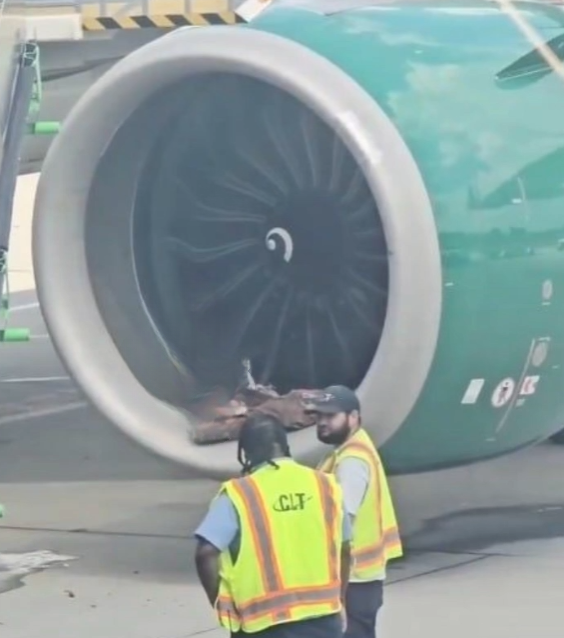On August 16, 2025, operations at Charlotte Douglas International Airport were disrupted after a Frontier Airlines Airbus A320 experienced an unusual ground equipment mishap before departure. The incident, while not resulting in any injuries, created significant delays for passengers and raised renewed awareness about the importance of airport ramp safety procedures.
The event occurred when a ground air-conditioning hose, which is typically connected to an aircraft during boarding to regulate cabin temperature, was reportedly pulled into one of the plane’s engines. The powerful suction from the Airbus A320’s left engine caused the hose to break apart, forcing ground crews and airline staff to immediately halt preparations for the scheduled flight.
The affected aircraft was originally scheduled to operate Frontier flight F93134 from Charlotte to New York’s LaGuardia Airport. However, the damage left the jet temporarily unserviceable. Passengers eventually departed for New York on a replacement aircraft nearly nine hours later.
The Sequence of Events
According to preliminary reports from aviation observers and individuals familiar with airport operations, the aircraft involved—an Airbus A320neo with tail number N365FR—had earlier completed a flight from Philadelphia to Charlotte (F92387), landing at approximately 10:25 AM.
As is standard during turnaround operations, ground service crews connected external equipment to the plane to provide necessary utilities while passengers boarded. This included the use of an air-conditioning unit, which supplies cooled air to the aircraft cabin when engines are not running.
While the exact details remain under investigation, the hose from this unit is believed to have been positioned too close to the operating engine. When the aircraft’s number one engine was powered on, the suction reportedly pulled in the hose. Upon contact with the rotatingcomponents of the CFM International LEAP-1A26 turbofan engine, the hose disintegrated.
The incident prompted an immediate shutdown of engine operations, inspection of potential damage, and involvement of Frontier Airlines’ maintenance and safety teams.
Aircraft and Technical Details
Aircraft Type: Airbus A320-251N (A320neo)
Tail Number: N365FR
Manufacturer Serial Number (MSN): 9340
First Flight: June 12, 2019
Engines: 2 × CFM International LEAP-1A26
Aircraft Age: 5.7 years
Frontier Airlines, known for operating a fleet of Airbus A320 family aircraft, relies heavily on the A320neo series due to its fuel efficiency and range advantages. The LEAP-1A26 engines installed on this aircraft are advanced, quieter, and environmentally efficient compared to older engine models. However, like all modern turbofan engines, they generate strong suction when powered, making ramp safety a top priority.
Initial confusion briefly circulated online, with some early reports suggesting that the aircraft involved may have been an A321. These claims were later clarified—official data confirmed that the plane was indeed an A320neo.
Passenger Impact
Passengers scheduled on flight F93134 faced extensive delays, with many reporting wait times of approximately nine hours before a replacement aircraft was arranged. Frontier Airlines provided updates throughout the day and worked to transfer affected travelers to another jet once maintenance confirmed the original aircraft could not safely continue service without further inspection and repair.
While lengthy delays are never ideal, travelers expressed appreciation that safety took priority over speed. Airlines are required to follow strict Federal Aviation Administration (FAA) regulations when it comes to any incident involving potential engine damage, even if no visible signs of failure are immediately present.
Safety Protocols in Action
Although the disruption was frustrating for passengers, aviation experts emphasize that this incident demonstrates why strict safety procedures exist on airport ramps. Ground equipment accidents, though rare, are recognized hazards in aviation operations.
The Federal Aviation Administration and the International Air Transport Association (IATA) both provide detailed guidance for preventing such situations, including:
Equipment Placement Rules – Ground service vehicles and hoses must remain outside clearly marked safety zones around engines.
Engine Operating Awareness – Engines should not be started until all unnecessary ground equipment has been cleared.
Communication Protocols – Ground crews and cockpit staff must maintain clear radio or hand-signal communication before powering engines.
Training and Supervision – Airline staff undergo specialized training to avoid accidental equipment ingestion into engines.
The fact that no one was injured underscores the effectiveness of these safeguards. Quick action by the crew to power down the engine and inspect the aircraft likely prevented more serious consequences.
Broader Industry Context
While such events are uncommon, they are not unprecedented. Ground equipment accidents have occurred across multiple airlines and airports worldwide, ranging from baggage carts making contact with fuselages to fuel hoses becoming entangled.
The cost of these incidents is significant—according to IATA estimates, ground damage costs airlines and airports billions of dollars annually in repairs, delays, and operational disruptions. To mitigate risks, many airports have invested in advanced monitoring technologies, improved training, and stricter oversight of ramp operations.
Charlotte Douglas International Airport, one of the busiest hubs in the United States, handles thousands of daily operations. With such high traffic, occasional mishaps are statistically more likely, though aviation remains one of the safest industries in the world.
Frontier Airlines’ Response
Frontier Airlines confirmed that no passengers or crew were harmed and emphasized that passenger safety remains the airline’s top priority. The carrier worked to re-accommodate travelers, provide updates, and coordinate with maintenance teams to assess the aircraft.
Airline spokespersons also noted that the affected A320neo will remain out of service until all required inspections are completed and the FAA grants clearance. Frontier’s proactive decision to switch passengers to another plane reflects the industry’s safety-first approach.
Public Reactions
As with most aviation-related incidents, news of the event spread quickly across social media. While some early posts mischaracterized the situation with dramatic headlines, official reports clarified that the incident was under control and posed no risk to passenger safety.
Travelers expressed mixed feelings online—some voiced frustration over the long delay, while others acknowledged that the airline handled the situation responsibly by prioritizing thorough inspection over rushing to depart.
Aviation enthusiasts also engaged in discussions about ramp safety procedures, pointing out how this event highlights the importance of strict adherence to established protocols.
Lessons Learned
Experts suggest that the Frontier Airlines event at Charlotte Douglas International Airport should serve as a case study for ramp safety training across the industry. Key takeaways include:
Heightened Awareness During Engine Start – Even seemingly minor equipment, such as hoses, can cause major disruption if not cleared from engine areas.
Ongoing Staff Training – Continuous refresher courses ensure ground crews remain vigilant and updated on safety rules.
Collaboration Between Airlines and Airports – Close cooperation minimizes risks and allows for rapid response when unexpected events occur.
Passenger Communication – Timely updates help manage frustration during delays and reassure travelers that safety is prioritized.
A Reminder of Aviation Safety Standards
Commercial aviation is widely regarded as the safest mode of transportation. Every incident—large or small—is thoroughly investigated to improve proce
dures, prevent recurrence, and maintain public trust.
This event, while inconvenient for passengers, ultimately demonstrated that safety nets work. Engines were shut down promptly, no one was harmed, and passengers eventually reached their destination.
Airports and airlines will continue refining practices to ensure that ground operations remain as secure as the flights themselves.
Conclusion
The August 16 Frontier Airlines ground equipment incident at Charlotte Douglas International Airport serves as a reminder of both the complexities and safety demands of modern air travel. While a ground air-conditioning hose being ingested by an engine created delays and mechanical concerns, the airline’s swift response, combined with established safety protocols, ensured that no injuries occurred.
For passengers, the experience may have been frustrating due to the lengthy delay. However, it also reinforced a vital truth: in aviation, safety must always come before convenience. Airlines, airport crews, and regulatory authorities all operate under this guiding principle, ensuring that even unexpected mishaps can be managed effectively and without harm to travelers.
As Frontier Airlines continues to investigate and repair the affected Airbus A320, the industry as a whole will use the event to strengthen safety culture and reinforce the importance of vigilance on the ramp. For travelers, the reassurance remains clear—while delays can test patience, they are often the result of safety measures working exactly as intended.


